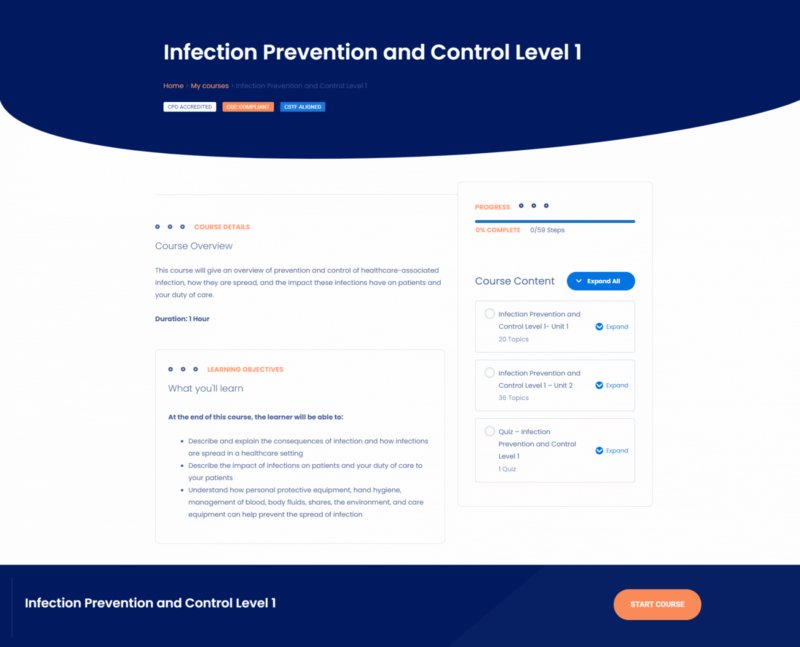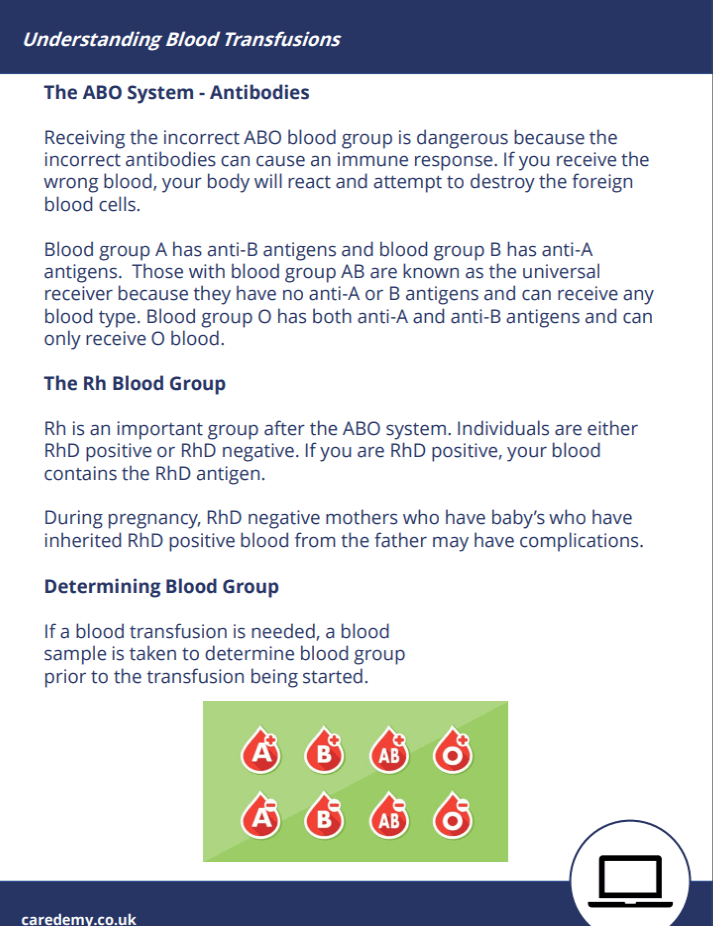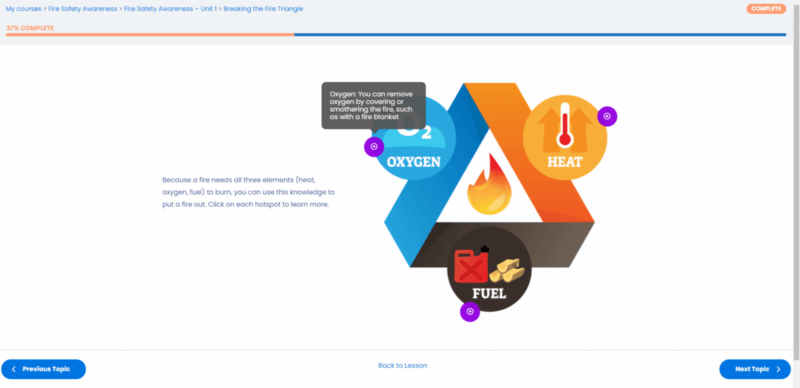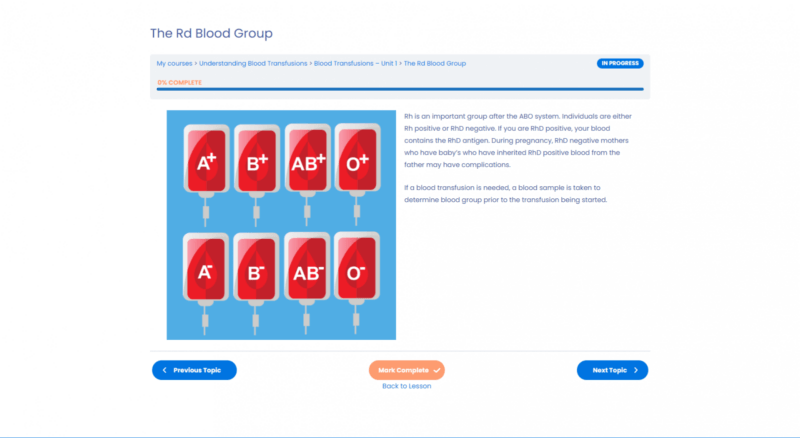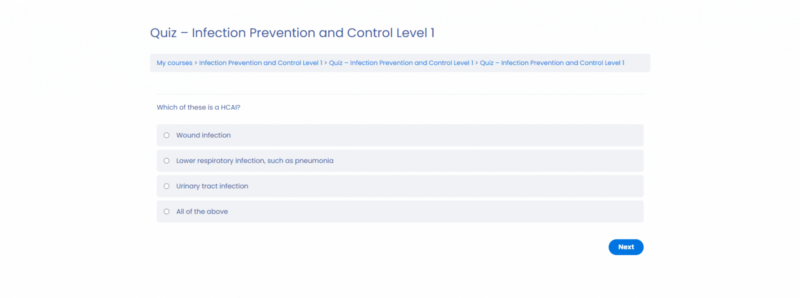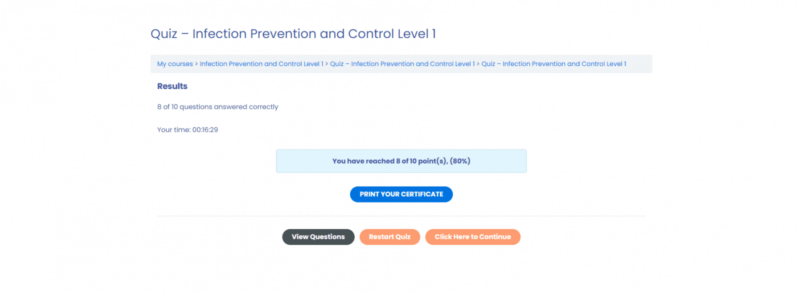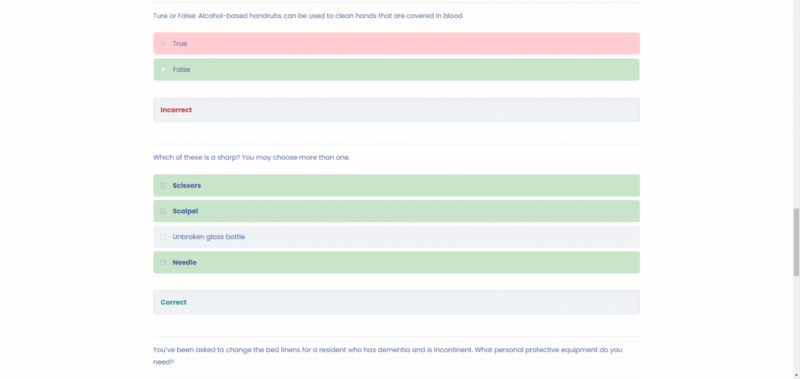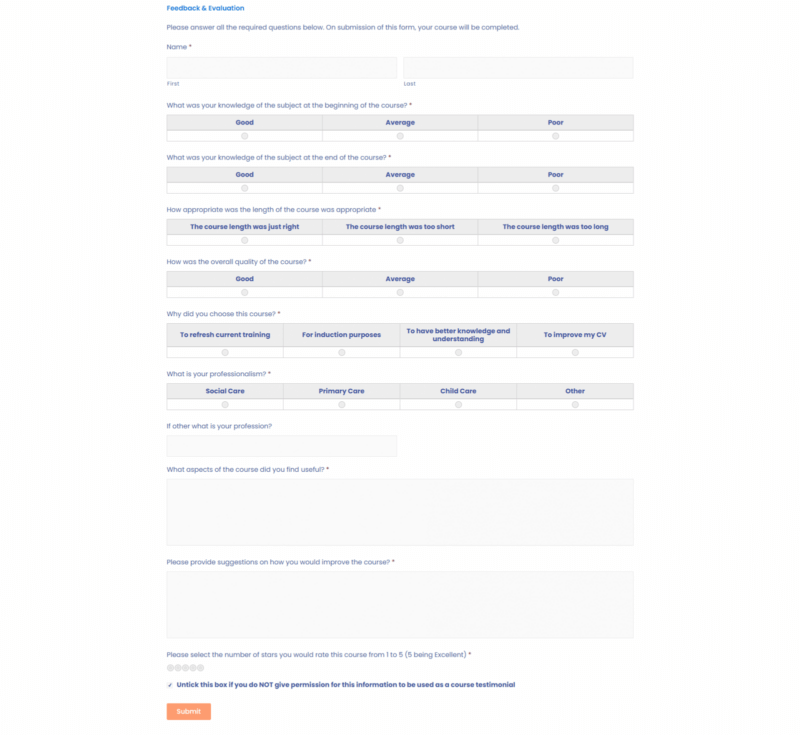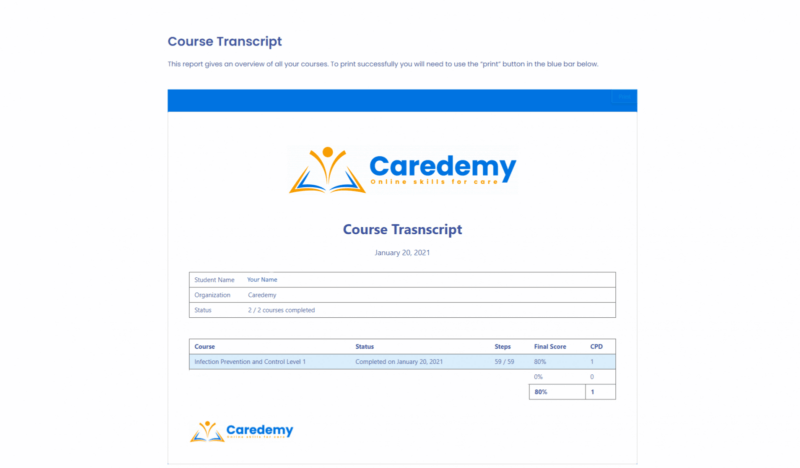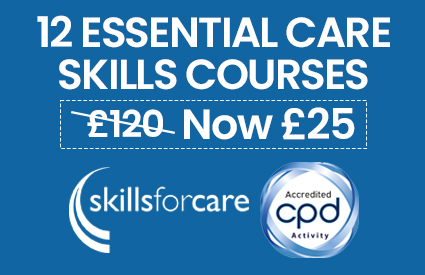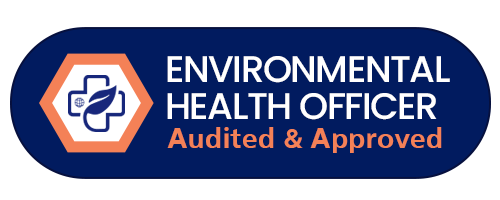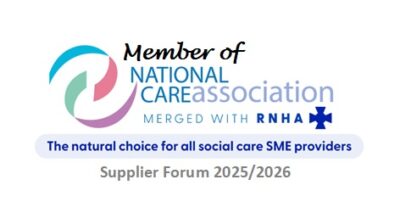Care Certificate Course
£30.00 Original price was: £30.00.£15.00Current price is: £15.00. +VAT
Save More
- Only £15 Each 1 to 9
- Only £12.90 Each 10+
- Only £9.90 Each 25+
- Only £7.90 Each 50+
- Only £5.90 Each 100+
14-Day Money-Back Guarantee
- Audio playback is included in this course
- Available in 50 different languages for translation
Why learn with us?
- Free course certificate
- Instant course access
- CPD Accredited
- Easy to navigate
- Downloadable workbook
- Multiple choice exam
- Resits included
- 12 month access


Why Learn with us?
A Trusted Assessed, Audited and Endorsed Training Provider
Your One Online Certificate Covering All 16 Standards
- Duration: Approximately 20 hours of study
- CPD Points: 21
- Certification: CPD-accredited certificate (issued after successful completion)
- Access Period: 12 months
- Course Last Updated: 07th June 2025
What You will learn?
Care Certificate Course Learning Objectives
This Care Certificate course covers the 16 mandatory standards outlined for new care workers in England. By the end of the training, you will:
- Understand your responsibilities within a care role
- Know how to work safely, ethically, and compassionately
- Communicate effectively with individuals and teams
- Support individuals with diverse needs, including dementia and mental health
- Recognise and respond to safeguarding concerns
- Follow infection control and health & safety procedures
Care certificate Online
the 16 care certificate standards
Each of the following standards is covered in detail, with practical guidance and assessments. You will receive one overarching CPD-accredited certificate upon completion of all 15 standards.
- Understand Your Role: Know your responsibilities, workplace policies, and values to deliver effective care.
- Personal Development: Create and follow a personal development plan with support for learning and growth.
- Duty of Care: Act in the best interests of those you support, assessing and managing risks appropriately.
- Equality and Diversity: Treat everyone fairly and with respect, embracing individual differences.
- Person-Centred Care: Support individuals based on their unique needs, preferences, and values, like dignity and independence.
- Communication: Use clear and effective verbal and non-verbal communication with all stakeholders.
- Privacy and Dignity: Promote and protect the dignity and privacy of individuals at all times.
- Fluids and Nutrition: Support individuals in accessing proper nutrition and hydration, based on their care plan.
- Mental Health, Dementia & Learning Disabilities: Understand and support individuals with mental health conditions, dementia, or learning disabilities compassionately.
- Safeguarding Adults: Recognise and report signs of abuse or neglect in adults, following safeguarding procedures.
- Safeguarding Children: Understand how to protect children from harm and take appropriate action if abuse is suspected.
- Basic Life Support: Be trained in and capable of delivering life-saving first aid in emergencies.
- Health and Safety: Follow health and safety procedures to manage risks and respond to accidents or illnesses.
- Handling Information: Handle and store personal and legal information securely and appropriately.
- Infection Prevention and Control: Maintain high hygiene standards and understand how to prevent and control infections.
- Awareness of Learning Disability and Autism: Equips you with the knowledge and skills to understand, communicate, and provide inclusive, person-centred support to these individuals, respecting their rights, needs, and individuality.
Who is this for?
How the Course Works
- Access course materials online anytime
- Work through modules at your own pace
- Use the included Skills for Care workbook, standards booklet, and progress log
- Final assessment via knowledge checks and employer-observed practice in the workplace
- Receive an official Care Certificate certificate once all standards are met and signed off
Note: While this online course covers all knowledge components, the Care Certificate cannot be completed by e-learning alone. Final practical sign-off must be carried out by a competent person in your workplace.
Who is this for?
Who is this Care Certificate training for?
This course is designed for:
- New health and social care staff working in regulated roles
- Healthcare assistants, support workers, care staff (e.g. domiciliary, residential, and hospice)
- Volunteers, cooks, porters, cleaners or maintenance staff who have direct contact with service users
- NHS staff providing support to clinical roles
- Anyone transitioning into the care sector from other fields
It’s also suitable for refresher training or CPD for experienced professionals
Why Choose Caredemy?
Take advantage of:
- Skills for Care Endorsed Provider: Recognition of training excellence
- 100% Online: Learn at your pace on desktop, tablet or mobile
- Instant Course Access: Sign up and start learning today
- Free CPD Certificate: Download and print upon completion
- Employer Sign-Off Tools Included: Booklets, mapping & progress logs
- CQC Compliant: Aligned with regulatory standards for new care staff
- 14-Day Money Back Guarantee
How to Enrol
Enrol online and start learning immediately. Or call us on 0203 488 7599 to book over the phone.
Employers can also use our Learner Management System (LMS) to manage team training, monitor progress, and prepare for audits and inspections.
The Benefits of Completing the Care Certificate
Add a visual or bullet section focused on direct learner benefits:
- Demonstrate your competence to current or future employers
- Increase your confidence in delivering safe, compassionate care
- Meet CQC induction requirements
- Gain a CPD-accredited certificate recognised across the UK
- Lay the foundation for future qualifications or apprenticeships
- Access learning materials anytime, from anywhere
- Boost your employability in the health & social care sector
Care Certificate Resources (updated March 2025)
Care Certificate Updated resources (2025)
In addition to the Care Certificate standards, there are a range of updated supporting resources available to help you implement the Care Certificate.
Below are key resources you can access:
- Care Certificate Standards
- Assessor Document
- Self-Assessment Tool
- Care Certificate Template
- Care Certificate (2025) FAQs
- Summary Of Changes to the Care Certificate in 2025
- How to use the care certificate
- Assessing Competence For The Care Certificate Free Course
These tools are designed to simplify the process of adopting the updated Care Certificate and ensure effective training for your team
Care Certificate Courses FAQ
Care Certificate Courses Frequently Asked Questions
Your course is instantly allocated to you upon completion of your purchase.
Yes, the Care Certificate Courses has been assessed and awarded a CPD accreditation by the CPD standards office.
Upon successful completion, you will be instantly awarded a CPD accredited Care Certificate Course certificate to download or print at home for free. We also have an option for you to request a hard copy of the certificate sent to your home or work address.
Yes, the Care Certificate Courses comes complete with unlimited exam retakes
Yes, the Care Certificate Courses will aid refresher training. It will give evidence of an understanding for staff induction. It will evidence awareness and improve your knowledge aiding your current skillset. A certificate is awarded upon completion.
We offer a complimentary learner management system to view the learner's course progress, view quiz results and certification. We also offer a dedicated compliance matrix to aid with audits and inspections.
Yes, you are able to purchase this course, you will be able to enter your details on the checkout page.
Yes, this Care Certificate is based on the UK Skills for Care guidance and framework and comes complete with competency workbooks and assessments.
When it comes to working in the healthcare and social care industry, it is essential to have the right qualifications and certifications to ensure the highest standards of care provision. Two important certifications that professionals often seek are the Care Certificate and CQC accreditation. In this article, we will explore the relationship between the Care Certificate and CQC (Care Quality Commission) accreditation to clarify any confusion and help professionals understand the importance of these credentials.
Understanding the Care Certificate:
The Care Certificate is a set of standards that individuals must meet to demonstrate their competency in providing high-quality care. Introduced in 2015, it is a mandatory requirement for new healthcare and social care support workers in England. The Care Certificate covers a wide range of topics, including duty of care, communication, safeguarding, person-centered care, and more. It provides a foundation of knowledge and skills necessary for delivering safe and effective care.
Exploring CQC Accreditation:
On the other hand, the CQC is an independent regulatory body in England that ensures healthcare and social care services are safe, effective, and of high quality. They monitor, inspect, and rate healthcare providers to encourage continuous improvements. CQC accreditation is a recognition that an organization meets the required standards of service provision, patient safety, and quality of care.
The Relationship Between the Care Certificate and CQC Accreditation:
While the Care Certificate is not directly CQC accredited, it is an essential component that contributes to the overall quality of care provided by healthcare organizations. The CQC regards the Care Certificate as a key indicator of staff training and competence. During inspections, the CQC assesses whether healthcare providers have appropriately implemented and monitored the Care Certificate standards for their staff. Compliance with the Care Certificate requirements is viewed positively by the CQC and indicates a commitment to delivering quality care.
Benefits of Holding the Care Certificate and CQC Accreditation:
For professionals, having both the Care Certificate and working in a CQC-accredited organization can offer several advantages. Firstly, it ensures that individuals are equipped with the necessary skills and knowledge to provide safe and competent care. Secondly, it demonstrates to potential employers and patients that you have met the required standards in your field. Lastly, working within a CQC-accredited organization provides assurance that the care provided meets the national quality standards and is continuously monitored for improvements.
Conclusion:
While the Care Certificate and CQC accreditation are not the same, they are closely interconnected and crucial for maintaining high standards of care in the healthcare and social care sector. The Care Certificate provides individuals with the essential skills and knowledge needed to deliver quality care, while CQC accreditation guarantees that healthcare organizations meet the required standards. By holding both certifications, professionals can demonstrate their commitment to excellence and contribute to the overall improvement of care provision.
Remember, continuous professional development is essential in the ever-evolving healthcare and social care industry. Keeping up-to-date with the latest standards and regulations ensures that you can consistently provide the best care possible.
References:
The Care Certificate - Skills for Care
About CQC - Care Quality Commission
CQC Key Lines of Enquiry (KLOEs)
Disclaimer: The information provided in this article is based on general knowledge and should not be considered as legal or professional advice. It is always important to refer to the official websites of relevant organizations for the most up-to-date and accurate information.
Pathways After the Care Certificate
Once you’ve completed the Care Certificate, you’re eligible to explore more advanced qualifications, including:
- Level 2 or 3 Diplomas in Health and Social Care
- Apprenticeships in Adult Care
- Specialist CPD courses like Medication Management, End of Life Care, or Mental Health Awareness
Completing this course puts you on the pathway to becoming a senior care assistant, team leader, or even a registered care manager.
This helps position the course as a career launchpad, not just a compliance tick-box.
What our customers say
Reviews
The course was quite challenging and tuff to complete but i had to dedicate my self to complete and finish it but overall good course
The course was informative and helpful
The course was easy to understand.
Information
How our courses work
Purchase
Add your course(s) to checkout & pay
Learn
Instant course(s) allocation. No waiting!
Assess
Pass the exam to obtain a certificate
Image examples
Take a peek at some of the materials
How it works:
Assessment & Certification
You will be given a multiple-choice exam available at the end of the learning, you will be graded. On a pass mark of 70% or higher a certificate is issued.
You may retake the test at your convenience at no additional cost.
On completion of the exam, a free certificate is instantly available for you to download or print.
A hard copy certificate printed on certificate grade paper can be purchased for a nominal fee via your learner dashboard and are dispatched within one working day to your address.
Limited Time Offer: Flash Sale Alert! ⚡💸
£30.00 Original price was: £30.00.£15.00Current price is: £15.00. +VAT
If you are purchasing for someone else tick this box.
You will allocate the course after purchase to an alternate person(s)
Why learn with us?
- CPD Accredited online courses
- Free instant course certificate
- No waiting with instant course access
- User friendly training, easy to navigate
- Downloadable Workbook
- Compliant to the care frameworks
- Multiple choice exam & resits included
- 12 month anytime course access
Save More by Buying More With Great Deals for Individuals and Teams!
-
Only £15 Each on 1 to 9 Courses
-
Only £12.90 Each 10 to 24 Courses
-
Only £9.90 Each on 25+ Courses
-
Only £7.90 Each on 50+ Courses
-
Only £5.90 Each on 100+ Courses
- Audio playback is included in this course at no additional cost
- This course is available in 50 different languages for translation


Unbeatable value team training
Be inspection ready Includes audit reporting & automated compliance – Online courses that learners complete.



